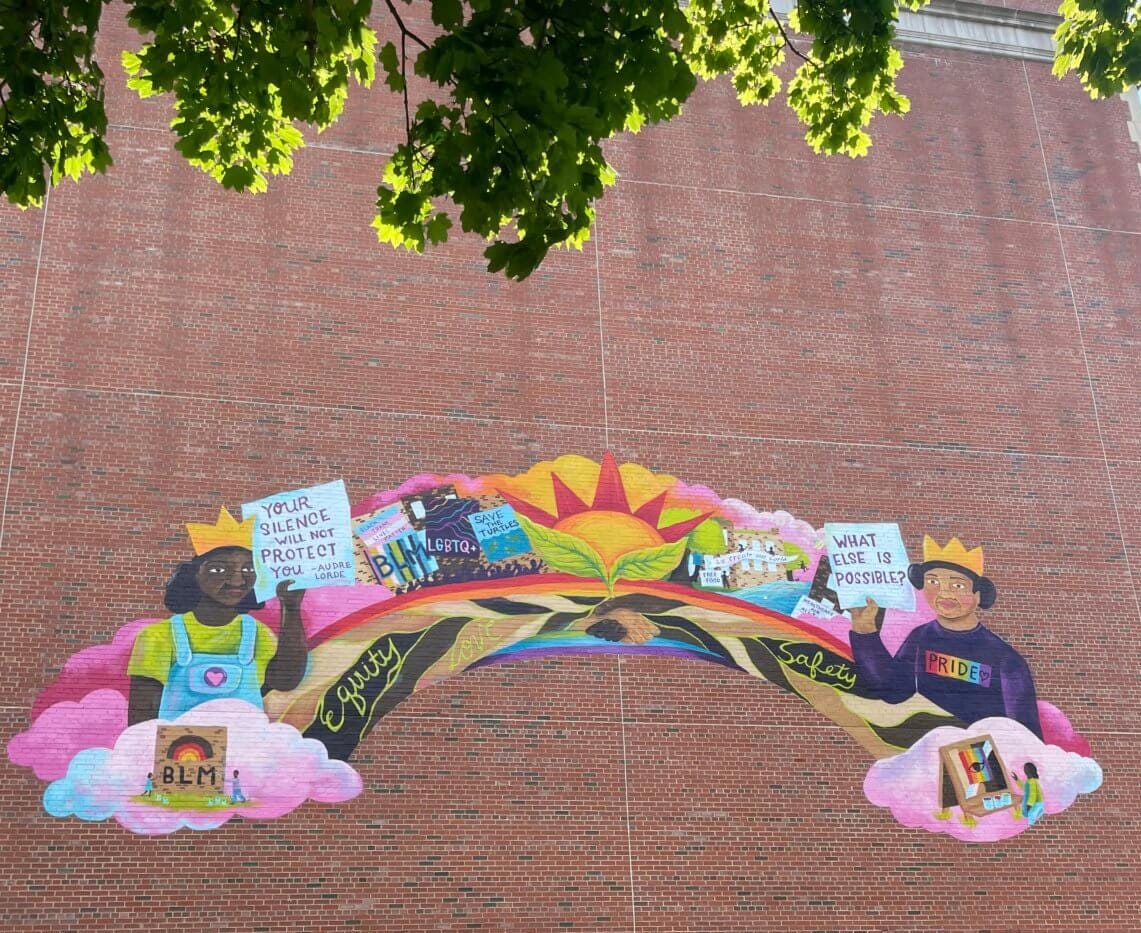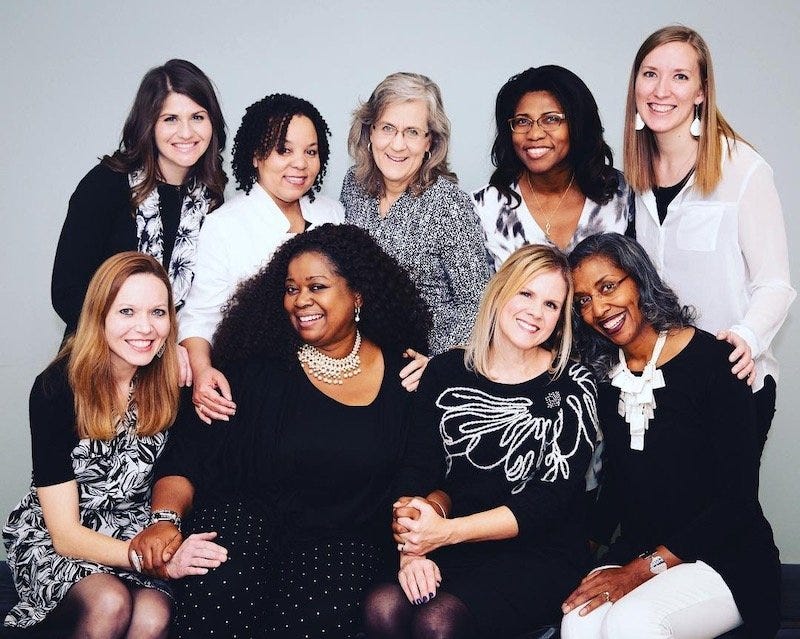💪 Celebrating the labor that holds up our democracy: the community entrepreneur
In this week's newsletter, New_Public co-director Deepti Doshi shares her Labor Day thoughts with a new school take on old-school labor: community entrepreneurs. And as we say a bittersweet goodbye to summer, we also look forward to the back-to-school energy and crispness of fall.
This labor day, I am reflecting on the labor that stands up our democracies: the people who organize our neighborhood gatherings and PTA meetings, the team behind Buy Nothing Groups, and our librarians - creating safe spaces for all kinds of people to connect and through working together build trust and deeper understanding of one another. I have been calling them “community entrepreneurs.”
I have been thinking about this topic for a while but really started thinking about the idea of “community entrepreneurship” when I was at Facebook (I still call it Facebook!) and was starting up our Community Partnerships team - leading the company’s relationships with Group Admins. Let me start by getting this out of the way: Facebook Groups are imperfect and often harmful. But there are people behind those groups doing great things, and that's what brought me to New_ Public: the opportunity to re-envision digital spaces and architecture that people can use to build healthy democratic communities.
IMHO some of the leaders behind Facebook Groups are geniuses. They hack Facebook Groups into places of deep, healthy, and meaningful community building - positively affecting people’s lives - and having the beautiful unintended consequence of strengthening the fabric of our democracy. Here are just a few examples:
Jahmal Cole founded My Block, My Hood, My City to inspire and engage neighbors to work with one another to solve local issues. By encouraging volunteerism - cleaning alleys, mowing lawns, shoveling for seniors, and hosting block clubs - across Chicago, Jahmal supports people to build relationships with one another to take responsibility for their city.
Luc Jaubert, Christian Delachet, and Jérémie Ballarin founded the “Wanted” community to promote mutual aid: for people to help each other find an apartment, a laptop, or modify a photo. Today, they bring together nearly 1 million members across France and have launched Wanted Cafés, socially responsible restaurants that strengthen local social ties & cohesion through simple actions: sharing meals and coffees with people in need.
Latasha Morrison is the leader of Be the Bridge to Racial Unity, a community that organizes small groups that share a common goal of creating healthy dialogue about race in the U.S. As a result of their work, people are using their knowledge to raise their children with less racial bias and a greater understanding of how to live in community with people of all backgrounds.
As I got to know people like Jahmal, Christian, and Latasha, I realized they aren’t different from people the people in my life who build communities offline: people like Pravin Uncle, a family friend who gathered the Jain community in Raleigh, NC (where I grew up) in his home one Sunday a month; or Marie Paul, a neighbor in Bombay, who worked tirelessly to organize neighbors to revitalize the local park; or Marguerite, our neighbor in Berkeley who decades ago started a neighborhood safety program. She continues to put a ton of time and energy into ensuring we are a supportive community, organizing gatherings on our block, welcoming new neighbors, and celebrating the people who care for us - like Kerry, our postman.
We all know some people like these in our lives - the people who are creating containers for healthy community building. They see solutions to problems through the lens of relationship. They connect people to one another and create and cultivate spaces for people to develop relationships to solve problems. They know these spaces need tending to remain healthy and put in the time and effort to do that work, even if they are not rewarded for it. Digital platforms just allow new kinds of people to step into these roles to design spaces and lead communities that encourage relationality and understanding in new and more robust ways.
Spaces for democratic experiences have been dwindling. From our personal experiences, we know that participation in local membership groups, PTAs, and neighborhood sports teams are at all-time lows, and our participatory lives are really different from that of our grandparents. And the research backs this up: for example, as Bob Putnam lays out in Bowling Alone, participation in parent-teacher organizations has dropped from more than 12 million in 1964 to about 7 million. Despite decades of increased urban migration bringing us more physically proximate to each other, we don’t know each other better — instead, our reported feelings of loneliness have shockingly doubled in the last 40 years. In 1970, 30% of Americans reportedly spent time with their neighbors at least twice weekly. Today, only 20% spend any time with their neighbors, and 33% report that they have no interactions at all.
Without spaces that cultivate belonging and a shared sense of purpose, why do we expect anything other than high rates of loneliness, polarization, and attacks on our Capital building?
The way out of this situation is to build armies of Jahmals, Marie Pauls, Christians, and Marguerites and to invest in them and build the field of “community entrepreneurship.” In my career, I have learned that naming things matters. Naming things can mobilize - investment, attention, and capital. Naming things can create identity and a sense of collective purpose and pride. For example, back when I was at Acumen in 2005, the idea of a social entrepreneur didn’t exist - it was a lexicon in its nascency. Today, young people get degrees in social entrepreneurship and have faith they can build sustainable careers as social entrepreneurs and be supported with training, funding, and recognition along the way.
If we want a better democracy, we need the same for community entrepreneurs. For too long now, these people have done this work without being paid, recognized, or even acknowledged. On Facebook, they are called group admins; on Reddit, they are moderators. But they aren’t just admins or moderators. They are leaders. They are entrepreneurs - forging new online and offline spaces and governing them as the foundation of our democracy.
At New_ Public, we see them as the stewards - and maybe even saviors - of our democracy. Because we don’t think a healthy democracy is built through just voting or laws but bottom-up — through democratic experiences where diverse groups of people come together with others to make good things happen. And the creation of healthy digital public spaces requires an investment in community entrepreneurs who will create and lead them, too. A field-wide coordinated investment. An investment of capital to support them and compensate them for their value; an investment of training in formal and non-formal ways to support them to get better; an investment in research and ways to measure the value of their work in tangible ways; and an investment in public awareness and demand for their work.
For us, this starts by identifying and learning from them - people like Naj Austin, who is building Somewhere Good, and Michael Wood, who leads Front Porch Forum - as well as learning from the community entrepreneurs who are using existing platforms, like FB Groups, Reddit, Discord, Slack or simple old school tools like email or WhatsApp or no digital tools at all. We are embarking on this project with All Tech is Human and will be sharing interviews and learnings here.
I don’t think we can overestimate how much we’re all benefiting from the invisible labor of community entrepreneurs. So, this Labor Day, I encourage you to think about a community entrepreneur that has affected your life and send them a note or give them a call with your appreciation! It matters - for our democracy.
—Deepti

How to Make Yourself More Human in an Automated World: In this episode of the How To Be A Better Human podcast, host Chris Duffy speaks with Kevin Roose about the impacts of AI-driven technologies, robots, crypto, and methods to leverage these tools to retain our autonomy while existing in a digital world. Listen to it here!
Arena’s Tips on Exploring Digital Worlds: Are.na recently shared “The Secret” to having meaningful explorations online – from venturing down rabbit holes, to synthesizing sources – and we’re taking notes!
Web Design As Architecture: As we take on the role of building healthy digital spaces, it is always important to have reminders and mini-blueprints of how digital systems work. This resource lists all of the ways we can envision websites as constructed environments that parallel the public places we encounter in real life.
The Critical Coding Cookbook: “To truly interrogate technological practice and its social implications, we need self-reflexivity.” From the pages of the Critical Coding Cookbook, Roopa Vasudevan’s guide for technological awareness includes a workshop for self-assessment of how you interact with digital tools, societal systems to build towards “more equitable technical practice.”
Community Corkboard
Unfinished Live: Unfinished lives annual gathering exploring the crucial collaborations of technology, art, ideas, and democracy shaping our society is just two weeks away. Building on the idea of community entrepreneurs, Deepti will be on the “The New City Planners” panel, discussing the question, “If social media companies are the new cities, who are the new city planners?” and the new roles for constructing healthy digital spaces. And Eli will speak on “Digital governance and the state of democracy,” a panel on how the data surveillance economy threatens democracies worldwide. The event is September 21st - 24th at The Shed in New York City. We are looking forward to learning together in community. Register using our link for a special discount on your ticket.
Garbage Day Newsletter: In a recent edition of the Garbage Day newsletter, Ryan Broderick gives a breakdown of online platforms, discussing tensions between TikTok and Instagram, while identifying the shifts in streaming sources, insights on the metaverse, and digital happenings around the world. Read the piece here!
Contributing Writers: Your perspectives on building healthy digital public spaces have informed the way we think about building them, and we want to bring your viewpoints and ideas to our broader community. If you are interested in becoming a contributing writer in one of our upcoming issues, please fill out this form, and we will be in touch if we feel there is a fit!
The Community Corkboard is our place to help spread the word about all the exciting projects the digital healthy spaces community is working on. Do you have an upcoming event or happening you would like us to list on the Corkboard?
🎒 ✏️ 📓 Feeling nostalgic for the thrill of new school supplies
—Debs
New_ Public is a partnership between the Center for Media Engagement at the University of Texas, Austin, and the National Conference on Citizenship, and was incubated by New America.









